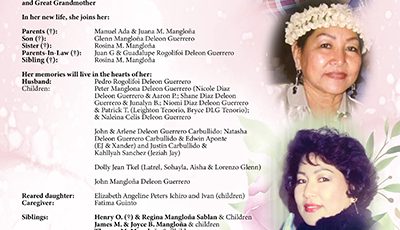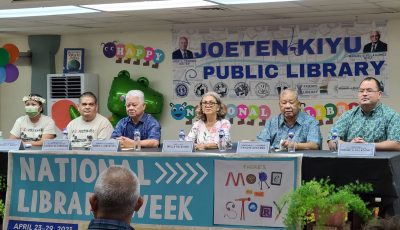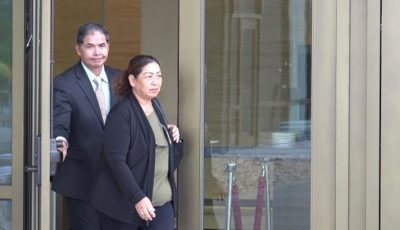IN CASE AGAINST EX-DPS CHIEF, EX-COP
OAG asks CNMI Supreme Court to intervene
The Office of the Attorney General has requested the CNMI Supreme Court to instruct Superior Court Associate Judge Joseph N. Camacho to reinstate the sexual abuse of a minor in the first degree each charged against former Department of Public Safety commissioner James C. Deleon Guerrero and former police officer Jesse S. Concepcion.
In the government’s petition for a writ of mandamus filed yesterday, assistant attorney general Matthew C. Baisley also asked the high court to direct Superior Court Presiding Judge Robert C. Naraja to recuse/disqualify Camacho from further consideration of this case in the interest of impartiality and fairness.
Baisley said extraordinary remedy is appropriate in this case because Camacho’s error was clearly erroneous and that the judge abused his discretion.
Last May 27, Camacho issued an order, dismissing without prejudice the charge of sexual abuse of a minor in the first degree each filed against Deleon Guerrero and Concepcion. Dismissal without prejudice means the OAG may re-file the charges.
In an 18-page order, Camacho said he finds no probable cause as to the charge of sexual abuse of a minor in the first degree as the government failed to prove an essential element of the offense.
Camacho said in this case the prosecutors filed charges of sexual abuse of a minor on the first degree that Deleon Guerrero and Concepcion committed in their specific capacity as police officers.
However, the judge said, at the April 22 and May 9, 2016, preliminary hearing the prosecutor failed to produce any evidence that the alleged victim knew Deleon Guerrero and Concepcion were police officers.
Camacho said he will issue a separate order(s) as to whether there is probable cause for misconduct in public office and conspiracy to commit sexual abuse of a minor in the first degree charges filed against the defendants.
Deleon Guerrero and Concepcion, through their counsel, have asserted an affirmative defense that they believed then that the girl they allegedly sexually abused at a beach site in San Antonio in June 2013 was not a minor.
In the government’s petition for writ filed yesterday, Baisley said Camacho impermissibly rendered a final decision on factual issue reserved for the trier of facts and discounted the facts alleged by the Commonwealth.
Baisley said Camacho failed to identify any contrary facts to those the government alleged, any factual disputes with such alleged facts, or any credibility issues with such alleged facts that would support dismissal.
The prosecutor said the judge based much of his decision on attributing to the Commonwealth an argument—whether defendants were “babysitters—the Commonwealth not only did not raise, but in fact explicitly rejected as frivolous at the preliminary hearing.
Baisley said in addition to rendering a decision at odds with the law, as well as with the position the Commonwealth actually took at the preliminary hearing, Camacho engaged in improper and prejudicial commentary regarding the Commonwealth’s case, an active and ongoing prosecution.
Baisley said in an unsupported portion of Camacho’s opinion that was not necessary to support its holding, the judge characterized the government’s theory of its case as “strange and bizarre,”—a characterization that can only be described as an ad hominem attack, not legal analysis—while inaccurately stating that the Commonwealth argued that defendants acted as “babysitters,” or “transferred babysitters.”
Ad hominem refers to attacking an opponent’s character rather than the opponent’s assertions or arguments.
He said the judge then encouraged the Commonwealth to carefully review its cases, suggesting that judge legal disagreement with the government somehow demonstrates neglect or lack of attention on the government’s part.
Baisley said Camacho quoted Berger v. United States case, suggesting that its legal disagreement with the Commonwealth is sufficient evidence that the Commonwealth engaged in misconduct by filing the charges in the first place.
“The trial court’s comments were improper, unfairly prejudicial, and were in fact based on the trial court’s own failure to properly analyze the law, and not any inattention or lack of diligence on the part of the Commonwealth,” he pointed out.
Baisley said the government alleged sufficient facts tending to show that a reasonable adolescent would have viewed defendants as in a position of authority.
Baisley said specifically, the Commonwealth alleged a sexual encounter, orchestrated and facilitated with an experienced sex-trafficker who was housing the victim, transporting the victim, and financially profiting from the victim’s sexual encounters.
He said the government alleged facts that tended to suggest a reasonable adolescent would have felt that she was required to participate in the sexual encounter, and that she had no reasonable means of escape.
Baisley noted that the Commonwealth did not allege that defendants were “mere strangers” who, in equal footing but for their age, persuaded the victim to participate in a sexual encounter.
Instead, he said, the Commonwealth alleges these defendants sought out the sex-trafficker and paid the sex trafficker to use her influence and control over the victim to facilitate a sexual relationship with a minor girl.
He said the sex trafficker then transported the victim to and from the custody of defendants.
Baisley said these facts were not disputed by Camacho and indeed the facts were incorporated into his order.
Moreover, the prosecutor added, Camacho failed to identify any contrary facts adduced by defendants tending to suggest a reasonable adolescent would not have viewed them to be in a position of authority.



























